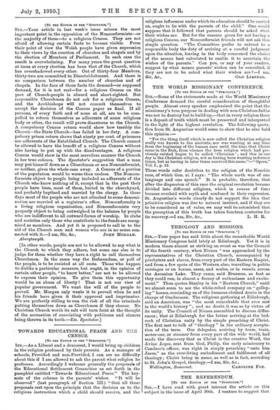THEOLOGY AND MISSIONS.
[TO THE EDITOR OF THE "SFIGTATO6.1
SIR,—Your paper has said little about the remarkable World Missionary Congress held lately at Edinburgh. Yet it is in modern times almost as striking an event as was the Council of the fourth century, when Nicaea " was approached by the representatives of the Christian Church, accompanied by presbyters and slaves, from every part of the Eastern Empire, and from a few spots of the Western also; travelling in public carriages or on horses, asses, and mules, or in vessels across the Ascanian Lake. They came, said Erasmus, as fast as they could run, in almost a frenzy of enthusiasm and excite- ment." Thus quotes Stanley in his " Eastern Church," until we almost seem to see the white-robed company on " gallop- ing " horses, reminding us of the burnous-clothed Arabs in the charge of Omdurman. The religious gathering at Edinburgh, said an American, was "the most remarkable that ever met in the world's history " ; and no doubt it was so by virtue of its unity. The Council of Nicaea assembled to discuss differ- ences ; that at Edinburgh for the better arriving at the bed- rock of Christian unity by the simple preaching of Christ. The first met to talk of " theology " in the ordinary accepta- tion of the term. Our delegates, arriving by tram, train, motor-car, or steamer from every part of the wide world, had made the discovery that as Christ is the creative Word, the divine Logos, sent from God, Philip, the early missionary to Candace's officer, was right in simply preaching " unto him Jesus," as the ever-living embodiment and fulfilment of all theology ; Christ being in name, as well as in fact, according to St. John's Gospel, theology.—I am, Sir, &c.,


















































 Previous page
Previous page